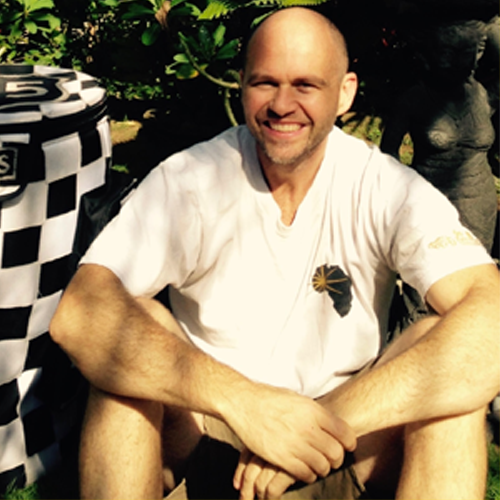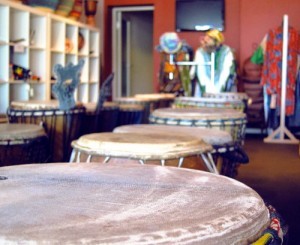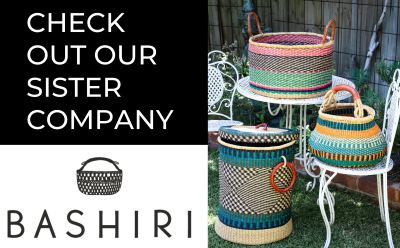

Favourite Part of the Job: The music
Plays: Djembe, dunun, kit, tama, aslatua… the list goes on!
My percussive inspiration first came from my ex DJ Mum’s penchant for tapping rhythms on the steering wheel of her yellow Mazda 323. From there a plastic drum kit appeared and at the age of 2, Mum and I had a tambourine and drum ensemble firing.
At 15 I decided to upgrade the kit and began lessons. A journey through Rock, Jazz and Funk studies followed. Many rudiments and dodgy pub and club gigs later I found myself interested in hand percussion and started a residency at Redhead Nightclub playing a darabuka and congas. Mic’ed up feeding the fire of the sweaty clubbers.
In 1998 my interest in hand percussion and a desire for something different, took me on a four-month study tour to Ghana, West Africa where I met members of touring groups Kusun Ensemble and Wala. I was pretty blown away by the role music plays in everyday life there. It is intertwined into all kinds of cultural ceremonies including weddings, funerals, circumcisions, and harvests.
I found the music challenging to understand, hard to play, energising to listen to, and soothing to be surrounded by. It was weird getting back to Melbourne afterwards and I felt slightly detached from society here for a while.
Whilst I kept busy freelancing as a drummer and percussionist back in Melbourne on return, and did a series of festivals and shows with Archie Roach and Ruby Hunter playing kit and hand drums, I was desperate to get back to West Africa.
At the start of 2000, I returned to continue my studies of traditional music. I spent 7 months studying in Ghana and Burkina Faso with Master Drummers from Ga, Ewe, Dagomba, Diola and Malinke tribes and began performing at ceremonies and festivals with Drum and Dance Ensembles.
I returned again in late 2001 for a 4-month tour of the region and performed in Mali and Guinea for the first time. This trip was full of interesting experiences as I drove my small Opell – modified with extra rear suspension – across 5 countries. I bribed my way across the region with broken French, pleading poverty as a musician. They didn’t buy it! This journey was special for other reasons too as I was travelling with Abou “Kora” Keita. Kora played with Soulaman Coli’s renowned theatre – Koteban in Abidjian for over 7 years. I continued my studies with him whilst in Burkina and Mali. During our 4 week stint in Bamako I also took classes with a lead drummer and dancer from the Malian Ballet, Mamadou Kante. Mamadou and I had a “love-hate” relationship but I learnt a tremendous amount from him about Mali rhythms and the good and not so good side to teaching styles.
Early 2003 Africa drew me back again where I studied with the Senegalese Ballet specializing in Talking Drum (Tama) and Sabar. Living with Bouly and Oumi Sonko and their family was an experience to be cherished. Bouly is the director of Les Ballet National de Senegal and Oumi, his wife, was the first lead dancer with the ballet many years ago. They introduced me to many amazing and generous people, of note, Medoun Houly, lead djembe drummer with the ballet who I played with every morning and arvo for 3 months. What a character and a very passionate man. His roots come from the Senegalese-Malian border so my insight into Bambara music deepened over this period. I also focused heavily on Sabar and talking drum, both intrinsic parts of Wolof culture. They have languages of their own and require different approaches to learn.
It’s important to note that each ethnic group has its cultural and musical roots that differ from the next. The musical landscape changes as you move from Senegal across and down to Ghana. All are proud of their music and will often tell you it’s the best in Africa. It’s hard to deny any of them.
It’s fair to say, I’m addicted to the music of these African ethnicities. The cultural significance of the rhythms enhances the attachment one has to the music, as does the communal bond that comes with playing polyrhythmic rhythms. It’s a wonderful feeling to “lose control” inside a song but still be an integral part of it.
In 2004 I returned for my 6th tour and commenced building a guest-house in Accra, Ghana. My partner Tuza and I have always talked about sharing this culture with others and giving students access to great teachers and a beautiful community .
Tuza is lead percussionist with international touring group Wala. We want to provide an authentic African experience for those coming to his community.
My Melbourne based business, “African Drumming — Centre for West African Culture” is still focusing on tuition in traditional Drum and Dance. Regular workshops at the St Kilda studio location are punctuated with classes by visiting touring groups such as Wala from Ghana, and Sydney based Mohata, which includes the Bangoura brothers Mohamed and Sibu from Guinea.
It feels different playing traditional music here as the context is not as fully understood, however when I play with my ensemble Zazu we respect the songs and rhythms we sing and acknowledge their heritage, whether we play them in strictly a traditional sense or draw from them to create something new.

Madou (L), Adama (R)
In January 2005, 13 drummers and dancers from Australia and the UK had an absolute ball, “going off” to the Ghanaian music and culture on Ekome Tour’s inaugural “Rhythm Power”. Most will return, no-one will forget. The second Rhythm Power tour was fantastic with 22 wonderful people blending in with the locals. We had two Irish and two Americans on board also.
Throughout this period I’ve stayed in touch with the developing contemporary music scene and worked on some exciting Dance, Hip Hop, and Folk Fusion projects
Update: 2006 (Jan)
Enjoyed a wonderful tour around Ghana and Burkina Faso. In particular, a visit to Djibasso to stay with the Keita family. 20 generations of Griot Balafola living near the Malian border were so welcoming. A truly rare family of musicians. Zoura the patriarch has 28 kids and 3 wives… they all play something very well!
In the middle of 2006 I spent two months in Paris hooking up with members of Nick Rowe Band — a French/Oz collaboration. Great jams, a few gigs and lots of creative head-space. A springboard for a new traditional Ensemble back in Melbourne was formed off the back of 6 weeks of writing.
“Ouaga” is an exciting new project that brings together years of indulgence in West African musical styles. A mix of Ghanaian Highlife, Manding Djembe, and Funked up HipHop
Update: 2007 (Jan)

Amino (Hausa Kalangu player)
Update: 2007 (Aug)

With Marche Traore (R) – Bamako Djembefola
Update: 2010

Update: 2011
A short trip to Guinea has introduced me to some incredible new artists and instrument makers. We have successfully landed our first container from Conakry with a large range of Guinean drums, balafon , Kora and more.
Update: 2012

This tour was a new muiscal adventure for me, deep into the heart of the Ewe rhythms. The Ewe inhabit the Volta region on Ghana’s east and are renowned for their complex rhythms and language. I have been fortunate to study intensively for a month with Afotey David Odai (pictured) from Nungua who is a specialist master drummer in all Ghanaian stick rhythms including the Ewe music. (David was approached by the Ghana national Theatre to train talented percussion students in stick and hand drumming styles). The complexities with their music is largely technical in the sense that there are over a dozen stick hand combinations including open, closed & muted methods. getting a grip on these techniques takes time. Secondly, given the permutations available it is far harder to hear exactly what is being played, which makes learning much slower. Whatever it takes me to do on a djembe will take 3 times longer with Ewe music. I would definitely classify it as a more complex and sophisticated form of percussion.
Afotey David Odai (Ghana Master Drummer)
Current Projects
Ouaga: 8 piece Melbourne based ensemble including 2 dancers
Djembe, Talking Drum, Duns, Balafon, Bell, Kit, Flute & sax, Berimbau & Didg
Past Projects, Collaborations and Shows
Archie Roach and Ruby Hunter
Avalanches – Belle and Sebastian Rix Mix “I’m a Cookoo” ( No 3 UK charts)
Nfa (1200 Techniques) – Solo Album
Zazu

